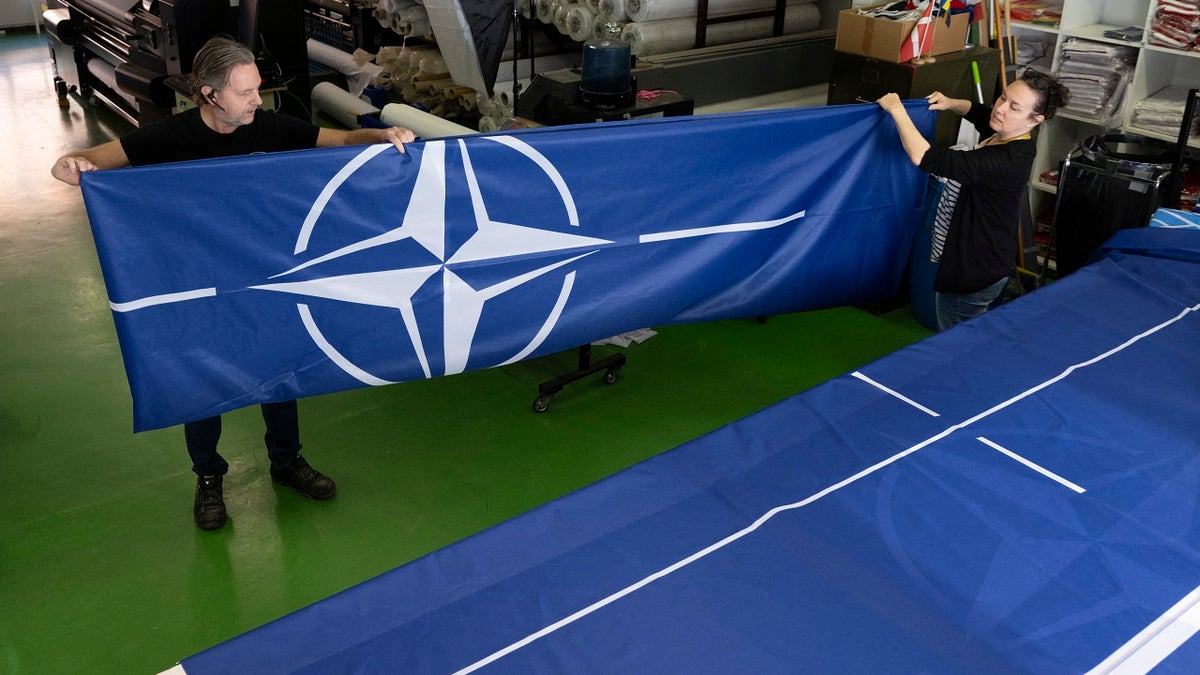NATO welcomes 32nd member, expert warns bigger bloc ‘exacerbates’ Putin’s fears
Sweden has officially joined the North Atlantic Treaty Organization (NATO) after almost a year of endless wrangling and negotiations, adding another key piece to the defense against Russian interests.
“Sweden is now a NATO member,” Swedish Prime Minister Ulf Kristersson wrote in a statement published on social media platform X.
“Thank you all allies for welcoming us as the 32nd member,” he continued. “We will strive for unity, solidarity and burden-sharing, and will fully adhere to the Washington Treaty values: freedom, democracy, individual liberty and the rule of law. Stronger together.”
Kristersson traveled to Washington, D.C., on Wednesday to complete the process of joining NATO, where he met with U.S. Secretary of State Antony Blinken, and will attend the State of the Union address as a guest of first lady Jill Biden.
HUNGARY’S PRESIDENT FORMALLY SIGNS BILL APPROVING SWEDEN’S NATO MEMBERSHIP, ENDING 18-MONTH DELAY
“Sweden is a strong democracy with a highly capable military that shares our values and vision for the world,” the White House wrote of the newest alliance member. “Having Sweden as a NATO ally will make the United States and our allies even safer.”
As a NATO member, Sweden, with its cutting-edge submarines and Gripen fighter jets, will be a crucial link between the Atlantic and the Baltic states in times of crisis, according to Reuters.
“Although (Russian President Vladimir) Putin is playing cool, this move almost certainly exacerbates the Kremlin’s fears of encirclement, the fear that is deeply routed in the Russian psyche, because most wars that Russia has fought were in the Western theater operations,” Rebekah Koffler, a strategic military intelligence analyst and the author of “Putin’s Playbook,” told Fox News Digital.
NATO LAUNCHES HISTORIC NORDIC RESPONSE DRILL IN FINLAND, NORWAY AND SWEDEN
Finland and Sweden had long resisted joining NATO, with many believing it would not shore up their national security and would in fact enrage Russia, but Putin’s invasion of Ukraine pushed the two countries to change their minds.
Finland enjoyed a rather straightforward process, joining the alliance in April 2023, but Sweden faced greater opposition. NATO requires unanimous support from members in order to admit new countries, and Turkey and Hungary did not initially support Sweden’s ascension, citing various concerns and seeming to use the application as a means of handling political disagreements.

Turkish President Recep Tayyip Erdogan laid out a series of conditions, including a tougher stance against Kurdish militants and members of a network that Ankara blamed for an attempted 2016 coup. The Kurdish question languished for a year, and Sweden enacted a number of changes to appease Turkey, including an end to an arms embargo and cooperation on fighting terrorism and public demonstrations from the groups.
Hungary, the last member to join the alliance before Finland and Sweden applied, did not look kindly on admitting a country that regularly criticized the Hungarian government and its prime minister, Viktor Orbán.
ALBANIA REFURBISHES SOVIET-ERA AIR BASE INTO REGIONAL HUB OF NATO AIR OPERATIONS
Orbán supported Sweden’s admission, but members of his party did not share that enthusiasm. Orbán argued that Sweden’s membership “will strengthen Hungary’s security.”
Pressure from the U.S. and NATO allies on Turkey finally removed Turkish opposition. With no more opposition, Sweden has now joined NATO — much to Russia and Putin’s frustration.

“The new development will likely drive Russia to beef up its force posture in the Western flank and to ratchet up its destabilizing activities in the region, probably in the Baltics and probably will act aggressively in the Baltic Sea,” Koffler explained, noting that Russia’s border with NATO has now doubled from around 750 miles to approximately 1,600 miles.
“We are not talking an outright invasion but rather cyber and other special activities, involving intelligence operatives,” she added.
The Associated Press contributed to this report.
Read the full article Here


